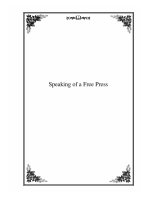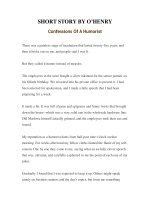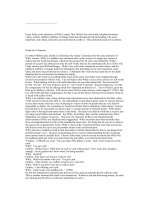death of a character
Bạn đang xem bản rút gọn của tài liệu. Xem và tải ngay bản đầy đủ của tài liệu tại đây (37.36 KB, 2 trang )
Essay looks at the character of Willy Loman. How Willy's low self worth, misplaced societal
values, and his stubborn inability to change leads him through his life pretending to be more
important, more liked, and more successful than he really is. This ultimately leads to his demise.
Death of a Character
In Arthur Miller's play, Death of a Salesman the reader is introduced to the main character of
Willy Loman. Willy is a middle-class salesman who, in the course of a single day, comes to
realize that the American Dream, which he has pursued for 40 years, has failed him. Willy's
pursuit of success has affected not only his self worth, but has also dominated the lives of his wife
Linda and his sons Biff and Happy. Willy's low self worth, misplaced societal values, and his
stubborn inability to change leads him through his life pretending to be more important, more
liked, and more successful than he really is. Ultimately this vision he has leads him to his death
thinking that he will actually be helping his family.
Willy's low self worth is not talked about much in the story, but rather more implied through
several conversations with his wife. I do not believe that Willy is even aware of the low self worth
he has. While talking with his wife and bother Ben, he says little things like "I'm not noticed"
(1470), "I'm fat. I'm very foolish to look at." (1471) and "I still feel - kind of temporary." (1478).
He compensates for this by talking about how important he thinks he is. "Go to Filene's, go to the
Hub, go to Slattery's, Boston. Call out the name Willy Loman and see what happens!" (1483) His
low self worth and then compensation for that is one of the factors that lead to his demise when he
is faced with reality of this.
Willy is an ordinary man, whose dreams and expectations have been shattered by the false values
of the society he has put his faith in. He understands society places great value on success and can
not see that society also has a way of placing it's values in front of people that are very hard or
impossible to obtain. He is chasing an 'American Dream' that is ultimately a false dream. Society
has told him to be successful you need to have a certain amount of material goods. Willy places
high value in having brand name items in his home. He doesn't see that he would be a success just
by being a good father and husband. For Willy, his brother, Ben, and his salesman hero, Dave
Singleman, are images of success. However, the character of Ben is far-fetched and the
achievements of Dave are idealized and exaggerated. Willy sees them and what he thinks they
have accomplished and sets this as the standard he must meet. By doing this he can never achieve
the success he so desperately wants. Willy's vision of the 'American Dream' and what society has
told him he must live up to are just another means to his end destruction.
Willy also has a stubborn streak in him that makes it all but impossible for him to see things from
another person's view. He goes on pretending to be a success and pretending that he is earning
more money than he actually does. Charley offers him a job on several occasions but Willy lets
his stubborn pride get in his way and refuses the job offers, even after he has been fired.
"Charley: I offered you a job. You can make fifty dollars a week. And I won't send you on the
road.
Willy" I've got a job.
Charley: Without pay? What kind of a job is a job without pay? Now, look, kid, enough is
enough. I'm no genius but I know when I'm being insulted.
Willy: Insulted!
Charley: Why don't you want to work for me?
Willy: What's the matter with you? I've got a job.
Charley: Then what're you walkin' in here every week for?
Willy: Well if you don't want me to walk in here
Charley: I am offering you a job.
Willy: I don't want your goddam job. " (1500)
He lets his stubbornness and pride get the best of him and just pretends that he still has a job.
This is another element that leads to his destruction. Without a job and borrowing money, he ends
up realizing that his life is worth more dead than it is alive.
Willy Loman is a man who let society's pressures and visions guide him through life and
ultimately kept him from being all the things he wanted most. He desperately wanted to be well
known, liked and successful. At the end of the play we find that he traveled paths that were set up
by his low self worth, societal values and his own stubbornness and ultimately led him to take his
life, thinking that the insurance money would help his son.
Works Cited
Miller, Arthur. "Death of a Salesman." Literature: An Introduction to Reading and Writing. 6th
ed.
Ed. Leah Jewell. New Jersey: Prentice Hall, 2001. 177-190.









